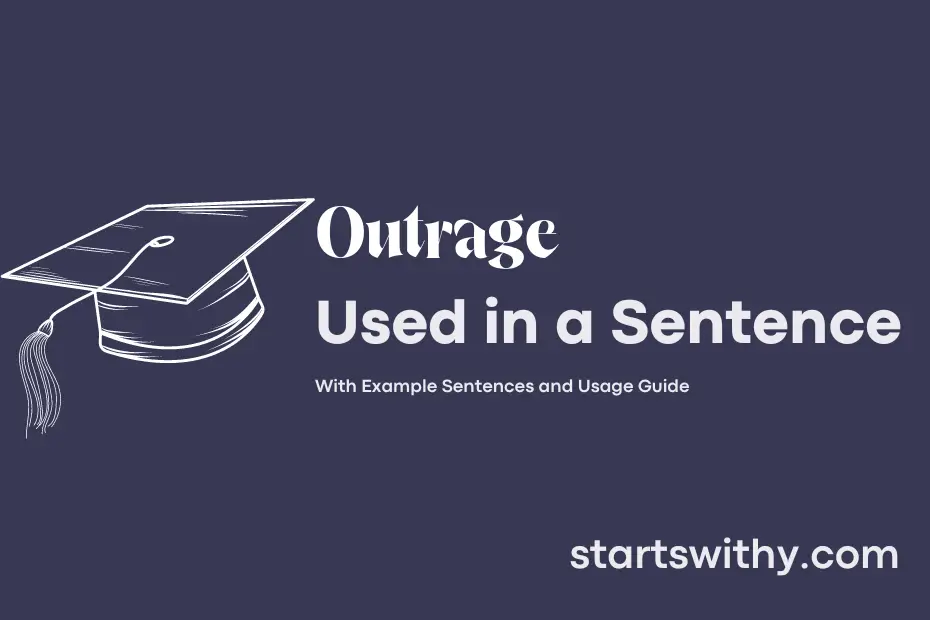Outrage is defined as a strong reaction of anger, shock, or indignation in response to a perceived injustice or wrongdoing. It is often accompanied by a sense of moral outrage or righteous anger towards a particular issue or event.
In today’s society, outrage is a common emotion expressed on social media, in the news, and during public debates. Whether it’s sparked by acts of injustice, political decisions, or controversial statements, outrage has the power to mobilize communities, ignite change, and bring attention to important social issues.
7 Examples Of Outrage Used In a Sentence For Kids
- I felt outrage when my friend took my toy without asking.
- It’s important to talk to an adult if you feel outrage about something.
- I showed my outrage by saying “No, thank you!” firmly.
- We should try to control our outrage and not yell at others.
- It’s okay to feel outrage when someone is being mean to you.
- Let’s take deep breaths when we feel outrage to calm down.
- Remember to use kind words even when you feel outrage.
14 Sentences with Outrage Examples
- Outrage erupted on campus when the administration announced a sudden increase in tuition fees.
- The student body organized a protest in outrage against the university’s decision to cancel a popular cultural festival.
- There was widespread outrage among students when the library reduced its operating hours during exam season.
- The lack of response from the college authorities to reports of sexual harassment sparked outrage among the students.
- Students expressed their outrage over the poor sanitation facilities in the hostel by launching a cleanliness drive.
- The professor’s offensive remarks about a particular community caused outrage among the student community.
- Outrage spread online after a video of security personnel manhandling a student went viral on social media.
- The cancellation of a highly anticipated guest lecture series led to outrage among the student body.
- Students were filled with outrage upon learning that the sports fest had been postponed indefinitely.
- The unfair evaluation of final exam papers by the faculty resulted in outrage and demands for transparency in the grading process.
- Outrage flared up when it was discovered that the college had misused funds meant for student welfare programs.
- The lack of accessibility for students with disabilities caused outrage within the student community.
- The inordinate delay in releasing semester exam results led to outrage and calls for accountability from the administration.
- The university’s decision to impose a strict dress code for cultural events was met with outrage from the student body.
How To Use Outrage in Sentences?
To use the word “Outrage” in a sentence, follow these simple steps:
-
Understand the Meaning: Before using the word “Outrage” in a sentence, make sure you understand its meaning. “Outrage” refers to a strong feeling of anger or shock caused by something considered unfair or unjust.
-
Choose the Right Context: Select a situation where the feeling of anger or shock fits appropriately. This could be related to a news event, social issue, personal experience, or any other scenario that evokes strong emotions.
-
Construct a Sentence: Build a sentence that conveys the sense of indignation or shock associated with the word “Outrage.” For example, “I felt a deep sense of outrage when I learned about the unjust decision.”
-
Provide Context: If needed, provide additional context in the sentence to help clarify why the feeling of outrage is justified. For instance, “The community’s outrage over the environmental pollution led to a series of protests.”
-
Revise and Refine: Review your sentence to ensure it effectively conveys the intended meaning of outrage. Make any necessary revisions to improve clarity and impact.
By following these steps, beginners can successfully incorporate the word “Outrage” into their sentences to express strong feelings of anger, shock, or injustice.
Conclusion
In conclusion, the various examples of sentences with “outrage” showcase its versatility in expressing strong feelings of anger, shock, or resentment. Whether it is used in the context of social media outrage, public outrage over an injustice, or personal outrage at an offensive remark, the word effectively conveys intense emotions and prompts action or reflection. These sentences illustrate the power of outrage as a tool for expressing dissent, demanding change, and standing up against perceived wrongs.
Through the examples provided, it is clear that “outrage” serves as a potent word for articulating powerful emotions and stirring reactions. It can be harnessed to fuel movements, mobilize communities, and prompt discussions on important social issues. The diverse ways in which “outrage” is utilized in sentences highlight its continued relevance in navigating complex societal dynamics and voicing displeasure with the status quo.



